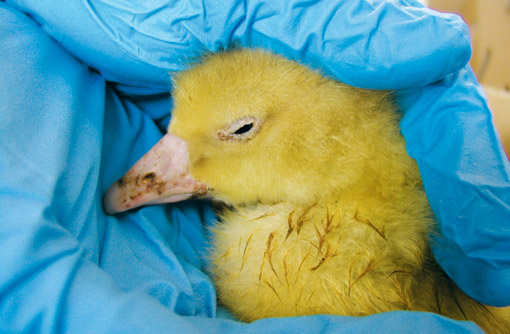Be on the look out for ‘goose plague’

Of all the diseases that geese can get, it is goose parvovirus, also known as “goose plague” or Derszy’s disease, that strikes the most fear into producers.
Fortunately, it is fairly rare, with the last major reported outbreaks occuring in 2004 and 2008. Despite this, goose producers are urged to maintain the utmost vigilance, as outbreaks can be devastating. Immediate veterinary attention should be sought if producers suspect GPV.
Clinical signs
The disease is very contagious and most severe in young goslings and Muscovy ducklings, with symptoms including a necrotic lining on the inside of the mouth and tongue, and regurgitation of food and water. Head shaking, weakness, eye and nasal discharge, swollen, crusted and sticky eyelids, diarrhoea and vent staining are other tell-tale signs.
In goslings under seven days old, mortality is anything between 50% and 100%, while birds from one-to-three weeks old can also suffer high mortality.
Birds that survive an outbreak develop immunity quite quickly, but are likely to be stunted, with poor feathering and may adopt a penguin-like posture.
Transmission
Rapid transmission within flocks is commonplace, as birds excrete large amounts of virus in their faeces. Older geese can become subclinically infected and pass on the virus to their progeny. Recovered birds can also act as carriers.
Machinery and other farm equipment can also spread the disease as the virus is very hard to remove using conventional cleaning agents.
No biological vectors have been identified, though the virus can survive for long periods in the environment. There is no human health risk and the disease is not notifiable.
Treatment and control
Currently there is no vaccine for GPV licensed for use in the UK. Despite this, most breeding flocks may be routinely vaccinated against GPV using imported live vaccine, under licence from the Veterinary Medicines Directorate.
This can afford a good level of protection to both the parent stock and their goslings. It is not fool-proof, however, and depending on the levels of antibodies passed on to goslings and/or the environmental challenge, the virus could still break through and cause a problem.
The Animal Health and Veterinary Laboratories Agency (AHVLA) recommends maximum vigilance, with producers advised to check the disease status of the breeding farms before purchasing eggs or goslings, and not to mix birds from different sources.
If a flock does go down with GPV, there are few, if any effective treatments. Antibiotics may stop losses from secondary bacterial infection, but will not treat the virus.If birds do recover, they should be reared separately and should never be used for breeding. Veterinary advice should be sought and culling survivors may be required.
What can goose farmers do to minimise the risk of GPV?
• Only purchase hatching eggs, goslings or breeding stock from flocks of known GPV status
• On breeding units, only eggs from known GPV-free flocks should be incubated together.
• Incubating eggs or mixing goslings from different breeding flocks should be avoided
• Do not allow goslings and older breeding birds to mix
• If a GPV outbreak occurs, no recovered or in-contact goslings should be retained for breeding
• Suspect carriers should also be reared away from other geese and Muscovy ducks
• Opportunities for contact between wild and domestic birds should be minimised where possible.
* The above article is based on advice supplied by Richard Irvine and Paul Holmes of the AHVLA. For more information visit theVLA website.
